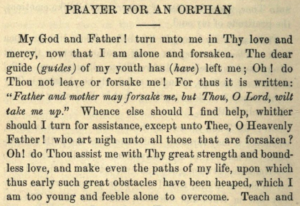Contributor(s): Shared on: 22 June 2020 under the Creative Commons Zero (CC 0) Universal license a Public Domain dedication Categories: Tags: | Contribute a translation | Source (English) |
|---|
|
My God and Father! turn unto me in Thy love and mercy, now that I am alone and forsaken. The dear guide(s) of my youth (has/have) left me; Oh! do Thou not leave or forsake me! For thus it is written: “Father and mother may forsake me, but Thou, O Lord, wilt take me up” Whence else should I find help, whither should I turn for assistance, except unto Thee, Heavenly Father! who art nigh unto all those that are forsaken? Oh! do Thou assist me with Thy great strength and boundless love, and make even the paths of my life, upon which thus early such great obstacles have been heaped, which I am too young and feeble alone to overcome. Teach and instruct me, that I may know Thy holy will and act according to the precepts of Thy Law. Who preparest nourishment for all creatures, who givest food to the young ravens when they cry to Thee, Oh! grant me also food, raiment, shelter and all the necessaries of life now and throughout my life. Grant me strength and power soon to procure myself all that I need, that I may not rely upon the gifts and help of others. But so long as I do want these, keep Thou alive the hearts of my benefactors and reward them all their goodness towards me. O God! be Thou with me, I hope in Thee unto eternity. Amen. |
“Prayer for an Orphan” is one of thirty prayers appearing in Rabbi Moritz Mayer’s collection of tehinot, Hours of Devotion (1866), of uncertain provenance and which he may have written. –Aharon Varady Source(s)
 Rabbi Moritz Mayer (originally Moses Maier, later Maurice Mayer; 1821-1867) born in Dürckheim-on-the-Haardt, Germany, fled to the United States and to New York as a political refugee of the 1848 revolution. In 1859, after seven years as the rabbi of Ḳ.Ḳ. Beth Elohim in Charleston, South Carolina, he returned in poor health to New York where he contributed frequently to the Jewish press, and translated various German works into English: Rabbi Samuel Adler's catechism, Abraham Geiger's lectures on Jewish history, and Ludwig Philipson's pamphlet, Haben die Juden Jesum Gekreuzigt? (the Crucifixion from the Jewish Point of View), et al. In 1866, a number of his English translations of Fanny Neuda's teḥinot in German (from her Stunden Der Andacht, 1855/1858) were published in a volume he titled Hours of Devotion. The work also included a number of his own prayers as well as those of Marcus Heinrich Bresslau. The following year, Moritz Mayer passed away. He was 45 years old.(We are indebted to Anton Hieke for his research on Mayer, " Rabbi Maurice Mayer: German Revolutionary, Charleston Reformer, and Anti-Abolitionist" published in Southern Jewish Life, 17 (2014), pp. 45-89.)For Mayer's translations of prayers by other authors, please visit here. Aharon Varady (M.A.J.Ed./JTSA Davidson) is a volunteer transcriber for the Open Siddur Project. If you find any mistakes in his transcriptions, please let him know. Shgiyot mi yavin; Ministarot naqeni שְׁגִיאוֹת מִי־יָבִין; מִנִּסְתָּרוֹת נַקֵּנִי "Who can know all one's flaws? From hidden errors, correct me" (Psalms 19:13). If you'd like to directly support his work, please consider donating via his Patreon account. (Varady also translates prayers and contributes his own original work besides serving as the primary shammes of the Open Siddur Project and its website, opensiddur.org.) Read a comment / Leave a comment (moderated) Works of related interest: |












Leave a Reply